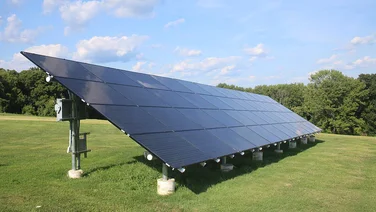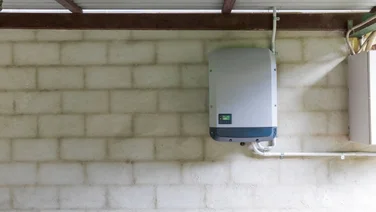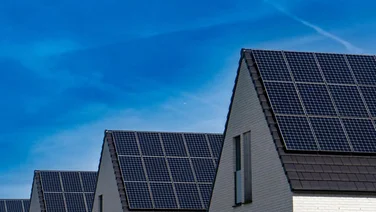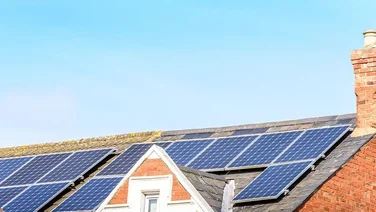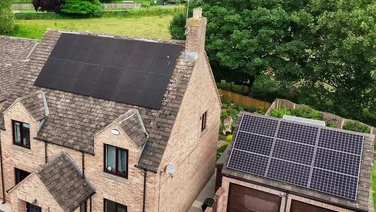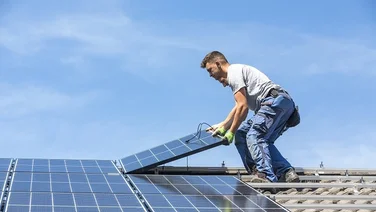- Solar panels are low maintenance, requiring only visual checks for dirt, debris, and damage
- Cleaning is recommended every 1-2 years to maintain peak efficiency
- Solar panels should be professionally serviced every 5-10 years

Solar panels typically last around 25-30 years with minimal upkeep, and you should clean them twice a year. The best way to make sure you get the most out of them is to keep them clean. That means regular solar panel maintenance is essential.
As well as looking after them, find out how to protect solar panels from theft by visiting our dedicated page.
Costs for cleaning solar panels vary and it will completely depend on how many you have and where they are on your property – i.e. how high they are. However, prices range from between £4-£15 per panel. In this article, we’ll cover solar panel care’s key dos and don’ts—from servicing and cleaning to monitoring performance and spotting issues early.
If you’re ready to install a new system, we can help. Just tell us a bit about your home, and our trusted suppliers will contact you with a free, tailored quote. And if your current panels are underperforming, check out our guide on what to do if you have broken solar panels.
Where do you want to install solar panels?
Get startedBut before we get into the weeds, for quick reference, the main tips for keeping your solar panels in tip-top shape include:
- Get your panels professionally serviced
- Inspect regularly for damage or performance issues
- Clean panels to remove dirt and debris
- Trim trees and remove any potential hazards
- Avoid shade—keep panels in full sun
- Ensure inverters show a flashing green light
- Track daily energy output
Maintain a logbook of all checks and work done
How do you maintain your solar panels?
Solar panels have no moving parts, which makes them relatively low-maintenance. However, to reduce solar panel costs and maintenance over time, you’ll need to care for them.
Here are a few things you should do to keep your panels running at peak efficiency.
- Get Your Panels Serviced
- Have a professional inspect your solar system every 5 to 10 years.
- This helps catch minor issues before they become expensive problems.
- Regular servicing ensures your system is running efficiently and saving you money.
- Check for any issues
- Visually inspect panels twice yearly—a pair of ground-level binoculars can help.
- Look for dirt build-up, loose bolts, or other visible damage to the mounting system.
- A sudden drop in energy output is often a red flag—investigate quickly.
- Clean your solar panels
- Panels typically need cleaning every five years, or more often if exposed to excess dirt (e.g., coastal salt, heavy pollen, or bird droppings).
- Use a hose from ground level to rinse them. Avoid pressure washers or detergents, which may void the warranty.
- Summer: Remove dust and pollen.
- Winter: Clear away snow and fallen debris.
- Remove potential dangers
- Trim overhanging branches to prevent damage from falling debris.
- Deter vermin, like pigeons and squirrels, from nesting or chewing cables.
- Consider bird-proofing your panels with mesh netting for long-term protection.
- Keep solar panels out of the shade
- Shading significantly reduces solar energy output.
- Keep nearby trees pruned, and remove ivy or other climbing plants that might creep onto your panels.
- Check the inverters for green lights.
- A flashing green light on your inverter means your system is functioning normally.
- If the light is off or another color, have the system checked—faults can escalate quickly if ignored.
- Remember: inverters typically need replacing every 10 years, before the panels do.
- Track daily performance
- Monitor how much energy is produced at the same time each day.
- This makes it easier to spot drops in output and address issues promptly.
- Keep a maintenance logbook
- A well-kept log helps professionals diagnose problems and maintain your warranty coverage.
- Record all cleaning, inspections, repairs, and replacements.

Do I need to turn off my solar panels before cleaning?
Yes, most manufacturers recommend that you turn off your solar panel system before cleaning it. This is less to protect the panels and more to eliminate the risk that you might be electrocuted. You can find instructions on how to turn off your solar panel system in the manual you should have received from your installer. This will also include instructions on how to turn it back on.
How much does solar panel maintenance cost?
To avoid having to pay for repairs, you need to get your solar panels serviced at least once every 5-10 years. A solar panel service will cost between £100 and £250.
But remember that doing so will prevent future issues for your solar panel system and hopefully lead to 30 years of solar-soaking panels. Cleaning your solar panels will also help avoid problems.
If you don’t want to do this yourself, solar panel cleaning costs £100-£250.
If something goes wrong and your solar panels need fixing, repair costs will vary depending on the issue. Small damages can cost around £80 to fix, while fully replacing a solar panel can cost over £1,000.
A few things, such as solar inverters, may also need replacing along the way. The inverter usually needs replacing every 10 years, and this costs £500-£1,500. The lifespan of your inverter, however, will depend on a range of things, including the potential power output, its conversion efficiency, and the type you choose.
Can I pressure wash solar panels?
No you shouldn’t pressure wash solar panels. This is because there’s a risk the high pressure could scratch or damage them. The best way to clean solar panels is to do so gently with a non-abrasive sponge and soapy water.
Solar panel maintenance top tips
- If mounting your roof to clean your panels isn’t an option, you can install automated cleaners like sprinkler systems. You can also hire a professional to come to your house to carry out the cleaning.
- Avoid DIY solar installations. Enlisting a professional installer is less likely to result in any dodgy complications
- Placement is everything. If you’ve researched solar panels, you’ll know these solar-soaking sheets love wide open spaces. Avoid shade, remove any overhanging tree branches, and ensure they’re given that wonderful sunshine. You’ll also want your panels to be placed at an angle – this way, any rain and debris will slide right off
- Think about the long-term. We know solar panel repairs can be costly, but try to avoid any quick fixes. By spending more on that new inverter, rather than repairing it over and over, you’re likely to save more money in the long run
How do I clean solar panels?
If you’re trained to clean solar panels, here are our biggest top tips:
- Turn off your solar panels before cleaning – Most manufacturers recommend doing this to help eliminate the risk of you being electrocuted. You can find instructions on how to do this in your manual.
- Use soapy water – it won’t require as much scrubbing and you’re less likely to break them.
- Wipe with a non-abrasive sponge to avoid scratches – No-one wants scratches on solar panels and they’re easy to make if you don’t use the right equipment.
- Do not clean the wiring underneath – This can damage your solar panels and cost a lot of money to fix.
- Early in the day is ideal – This is because dew will soften the grime on your solar panels and make them easier to clean.
- Clean your panels from the ground – We’ve mentioned how dangerous it is climbing on your roof untrained, as you could fall and seriously hurt yourself, but it could also damage your solar panels.
- If you can’t clean them from the ground, hire a professional – We don’t want you to get hurt, so instead, consider researching professionals who can help.
- Avoid pressure washing your solar panels – There’s a risk the high pressure will scratch or damage your solar panels, so avoid this as much as you can. The best way to clean them is gently, with a non abrasive sponge and soapy water. But you can use a hose if your solar panels are low enough for the hose to reach them. Just make sure not to use high pressure water.
Why do you need to clean your solar panels?
You want your panels to be spotless, as it keeps them working at full strength, which will lead to more savings, making the upfront cost of the solar panels worth it.
But the rain will clean them, surely? Unfortunately, no. Rain may wipe away some of the dust and debris, but your panels need a proper clean – particularly as your solar energy generation is only as strong as your weakest cell, if you’re using a string inverter.
If you abandon your panels to the ways and whims of nature, they’ll end up defaced and blighted by leaves, dust, pollen, and other particulate matter – not to mention bird droppings. Even the best solar panels on the market won’t be able to power your home efficiently with bird droppings all over them.
That’s because dust and other debris prevent your panels from receiving as much direct sunlight. In fact, dust and particulate matter can reduce a solar array’s production by as much as 25%, according to the American Chemical Society.
Do solar panels in the UK need extra maintenance?
Solar panels in the UK do not typically need extra maintenance, since the UK climate is generally favourable.
According to manufacturers’ standards, 25°C is the optimum temperature for solar panels, so the UK summertime is the prime time for your panels.
However, the UK is also notoriously drizzly, which can affect your panels if installed improperly. To ensure your panels generate the most energy possible, make sure they are installed at an angle so that rain runs off smoothly while dislodging any stray debris.
Luckily, most areas of the UK aren’t prone to getting much snowfall in the winter. Though this is bad news for sledging fanatics, it’s great news for solar panel owners, saving massively on repair and maintenance costs.
Summary
- Solar panels are low-maintenance, but a little care goes a long way.
- Regular servicing and cleaning will help extend your system’s lifespan.
- Watching for shading, pests, and inverter faults can prevent bigger problems.
- Maintenance costs are modest compared to the long-term savings on energy bills.
- Most UK homeowners won’t need extra upkeep—just clever placement and installation.


